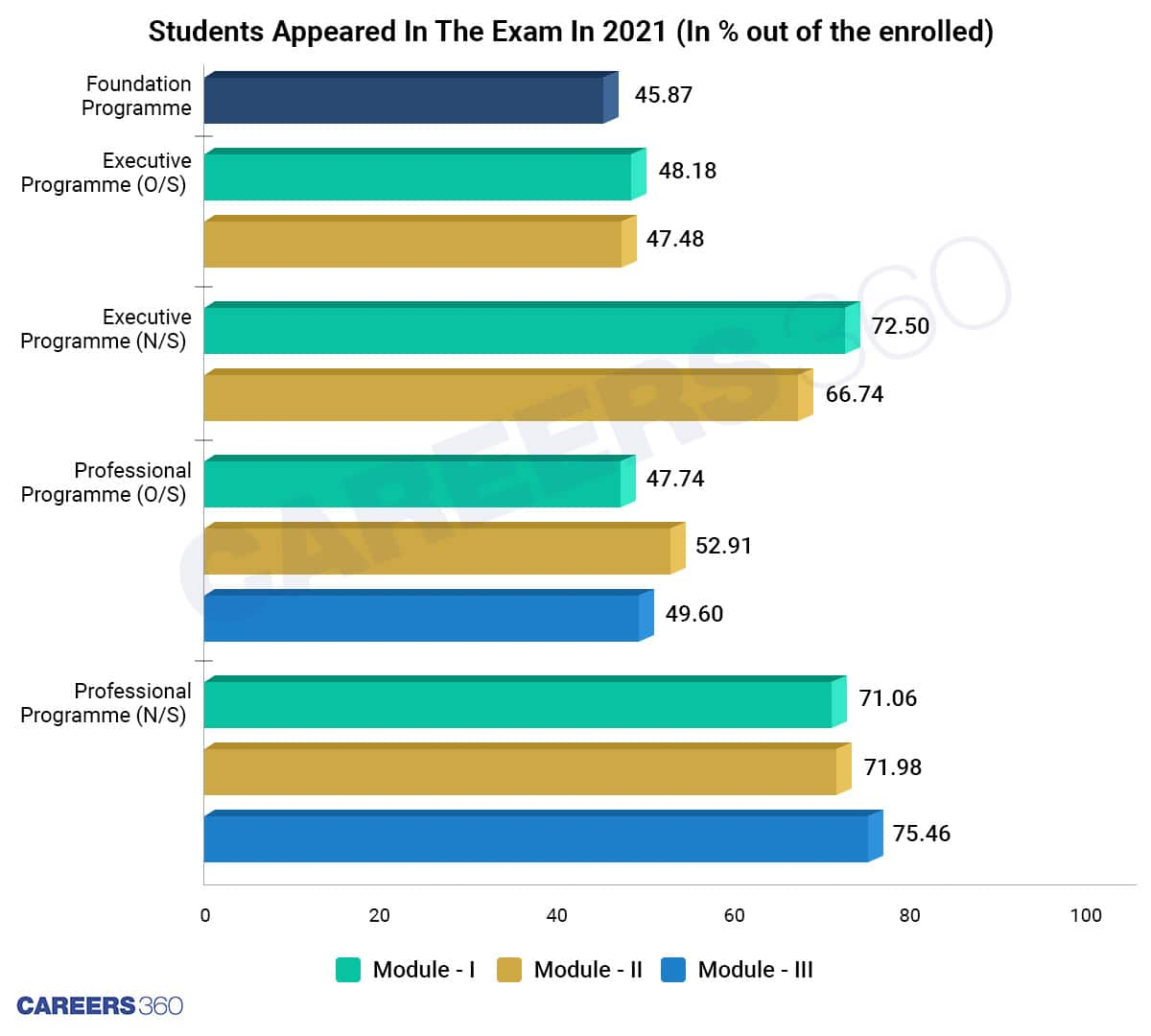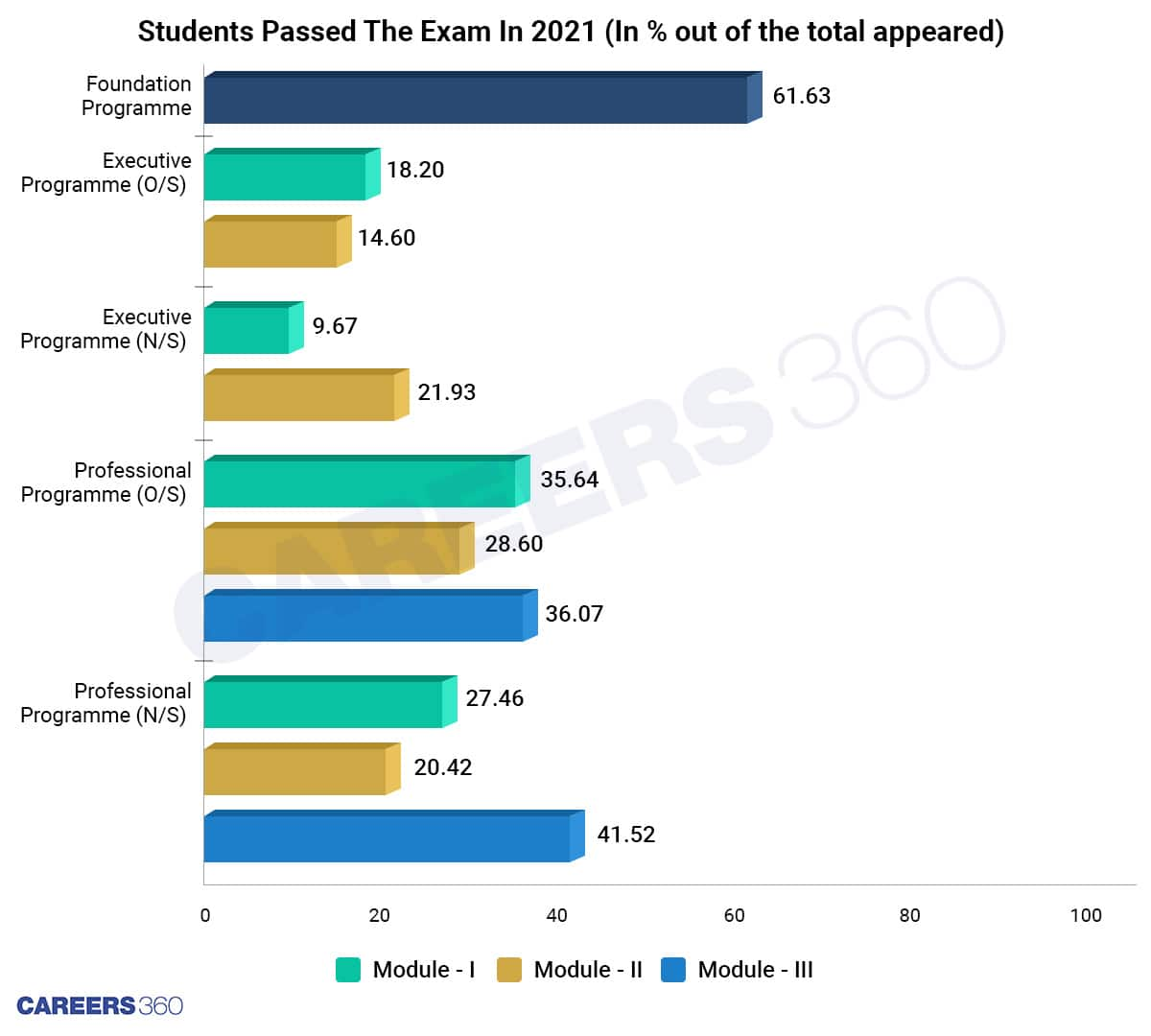UPES Dehradun | B.Com Admissions 2026
Last Date to Apply: 25th Feb | Ranked #45 Among Universities in India by NIRF | 1950+ Students Placed 91% Placement, 800+ Recruiters
In 2020-21, a comparatively lesser number of students appeared for exams in different levels of Company Secretary (CS). More percentage of students cleared a single module of CS exam levels than a complete level at one go.

There are three stages in the CS exams- Foundation, Executive and Professional programme. The entry level programme- foundation consists of a single module which has four papers in it. The executive programme has two modules with eight papers, four papers each module. The professional programme has three modules with three papers each.
After deep research on the different levels and all the modules of the CS programme, Careers360 concludes that the programme is tough but not impossible. This article contains detailed information about the number of students enrolled, appeared, and passed in each module of different stages over the last three years.
In 2020-21, the foundation programme had a very less number of students who appeared for the exam as compared to other levels. Students from the professional programme who had the new syllabus had the highest percentage of appeared students in all the modules as compared to the other level. But in numbers, maximum students appeared for the executive programme with the new syllabus.
Last Date to Apply: 25th Feb | Ranked #45 Among Universities in India by NIRF | 1950+ Students Placed 91% Placement, 800+ Recruiters
B.Sc (Hons) Admissions 2026 Now Open | Ranked Among the Top 100 Universities in the World by QS World University Rankings 2025 | Early Round 2 Applications Deadline: 29th Jan’26
 Appeared Students
Appeared Students
Although number of appeared students in 2020-21 were very less in the foundation programme, but out of that appeared student more than 61 per cent of students passed the level and it became the highest number among all the levels of CS exam.
Except for the foundation programme, other levels had the maximum number of students appearing, but the passing rate was very low. This shows that the levels were much tougher than foundation level.
 Passed Students
Passed Students
The overall percentage of students who appeared after registering for CS exams has gone down since 2018-19.
For foundation programmes, more than 10,000 students enrolled in the previous two years but in 2020-21 just 375 students enrolled out of which only 172 appeared and 106 passed.
Students Who Appeared For The Exam Over The Last Three Years (In %)
STAGE OF EXAMINATION | 2020-21 | 2019-20 | 2018-19 |
Foundation Programme | 45.87 | 66.70 | 93.05 |
Executive Programme (O/S) | |||
Module - I | 48.18 | 47.05 | 67.66 |
Module - II | 47.48 | 45.75 | 66.07 |
Executive Programme (N/S) | |||
Module - I | 72.50 | 63.31 | 82.71 |
Module - II | 66.74 | 58.99 | 81.39 |
Professional Programme (O/S) | |||
Module - I | 47.74 | 48.27 | 65.57 |
Module - II | 52.91 | 52.09 | 66.12 |
Module - III | 49.60 | 49.72 | 68.26 |
Professional Programme (N/S) | |||
Module - I | 71.06 | 68.60 | 81.48 |
Module - II | 71.98 | 70.84 | 80.12 |
Module - III | 75.46 | 71.33 | 85.13 |
Also Read | 5 Questions You Must Ask Your Career Counsellor
Except for the foundation programme, the other level has a very low percentage of students who passed. With the analysis of three years we can conclude that it is easier to pass the foundation programme than the other two programmes. Also more percentage of students pass the old syllabus’s module than the new syllabus one.
Students Who Passed The Exam Over The Last Three Years (In %)
STAGE OF EXAMINATION | 2020-21 | 2019-20 | 2018-19 |
Foundation Programme | 61.63 | 70.22 | 67.14 |
Executive Programme (O/S) | |||
Module - I | 18.20 | 15.21 | 13.58 |
Module - II | 14.60 | 21.32 | 16.58 |
Executive Programme (N/S) | |||
Module - I | 9.67 | 8.28 | 7.69 |
Module - II | 21.93 | 15.52 | 11.96 |
Professional Programme (O/S) | |||
Module - I | 35.64 | 28.01 | 30.19 |
Module - II | 28.60 | 28.39 | 23.79 |
Module - III | 36.07 | 33.56 | 34.28 |
Professional Programme (N/S) | |||
Module - I | 27.46 | 19.44 | 40.13 |
Module - II | 20.42 | 17.33 | 28.59 |
Module - III | 41.52 | 34.57 | 31.07 |
UGC has recognised the Company Secretary qualification as equivalent to a Master's Degree. Now, the students who successfully completed the CS can apply and appear for the UGC NET exam, also candidates can go for the PhD programmes in Commerce or related fields.
Among top 100 Universities Globally in the Times Higher Education (THE) Interdisciplinary Science Rankings 2026
100% Placements Assistance | 1200+ Recruiters
High-quality global education at an affordable cost. International exchange programs & collaborations
Awarded as the most Promising brand | Meritorious Scholarship available
#14 in India by NIRF Ranking | Institution of Eminence by Govt. of India | Scholarships Available | Highest CTC 1 Crore
NAAC A+ Accredited | Among top 2% Universities Globally (QS World University Rankings 2026)